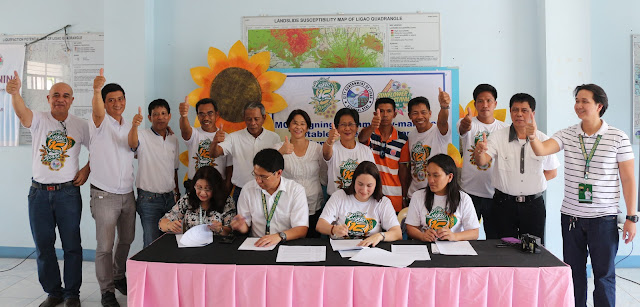Pathways and bridges provide great convenience to residents as it makes transportation and daily routines more efficient. Residents can save time, effort, and money when taking shorter routes.
In Barangay Bongoran, Oas, the residents used to ride vehicles or walk through longer routes to get to the Poblacion market of Oas and roads going to Polangui and Ligao. As this route usually take about 15 to 30 minutes of travel time and Php 15 transportation fare, residents chose to take the other route – that is by crossing the river through a wooden raft. Travel time is reduced to five minutes and fare is only two pesos for each round trip. However, crossing the river is risky especially during rainy days when the water level rises. Residents have to compromise their safety and convenience to save time.
Due to this inconvenience and danger brought to the residents, Congressman Fernando V. Gonzalez, with the local government, made efforts to address this concern.
On November 2015, a 60-meter hanging bridge was constructed connecting Barangay Bongoran to Poblacion area of Oas. Many residents proved that this structure is indeed a great convenience to them.
One of them is Justin Peranca, a Grade 8 student at Oas Polytechnic School who used to cross the river by riding the wooden raft whenever she goes to school. However, the wooden raft is only available until 5 pm. At night and during rainy days when the route is not safe to take, residents including college students who attend night classes have to chose longer routes. Like Peranca, many students are experiencing the great convenience brought by the establishment of the hanging bridge as this enables them to save time and money going to and coming home from school.
 |
| Justin Peranca is a Grade 8 student from Oas Polytechnic School |
According to Bongoran Barangay Captain Rodel Realco, the construction of the bridge is also beneficial to his vendor-constituents. Many of his constituents sell Sampaguita flowers for a living. As early as three in the morning, Sampaguita vendors are already out in the streets to begin their day. Since they start before daylight, crossing the river is not safe, hence they have to take the longer route to reach Poblacion area. The hanging bridge now provides them a convenient and safer path.
 |
| Bongoran Barangay Captain Rodel Realco sees the great benefit of the hanging bridge to his constituents |
Consuelo Peralta, a 63-year old resident of Bongoran, is a Sampaguita vendor and a frequent passerby at the bridge. Before the bridge was constructed, she pays Php 10 for a ride going to Poblacion area via the longer route. With the newly-constructed hanging bridge, Peralta no longer needs to spend transportation fare to reach her destination.
 |
| Consuelo Peralta, a 63-year old Sampaguita vendor is a frequent passerby at the bridge. |
Aside from Peralta and Peranca, Barangay Kagawad Edna Rillo also frequently passes through the bridge. Kgwd. Rillo used to walk around from her house to Poblacion area which usually takes her 30 minutes to reach the destination. Now she's experiencing convenience in taking a shorter and safer route at the hanging bridge.
 |
| Barangay Kagawad Edna Rillo said that they are making efforts to keep the bridge in good condition. |
Due to the great convenience the structure provides, the barangay officials and residents are also making an effort to maintain the bridge. They limit the passage of motorcycle with heavy loads and prioritize the use of structure as footbridge. They also value the safety of the residents especially the students, hence, keeping the bridge in good condition is one of their primary concern in area.
Aside from the construction of the hanging bridge, the flood dikes are continuously improved to mitigate flooding and protect livelihoods and properties of the residents.
Congressman Gonzalez coordinates with the Department of Public Works and Highways to achieve the desired structures with robust materials that would benefit communities for a longer period.
Lala Peñafiel / albay3d.blogspot.com
































